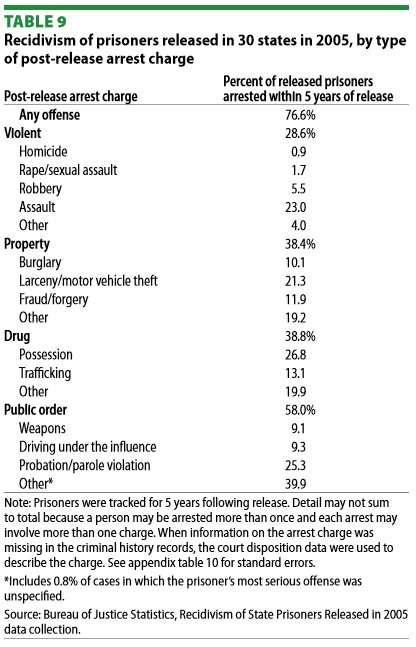Of Course Recidivism Is High When Everything Is a Crime


A new report released this week from the Bureau of Justice Statistics indicates that slightly more than three-quarters of released prisoners will end up arrested again within five years.
The report has not gotten a whole lot of attention, though Caitlin Dickson delves into the stats over at The Daily Beast and tries to draw out some meaning. After noting that rearrest doesn't mean these people end up back in prison (that number is much more modest, less than 30 percent), she spoke with some college experts:
CUNY's John Jay College of Criminal Justice Professor Deborah Koetzle … hopes that the drastic numbers will spark more conversation about the need for rehabilitation and re-entry programs to combat recidivism.
"In a lot of ways we set people up because we put them in prisons, which are are coercive, violent environments that can have psychological impacts, and when they come out we put up a lot of barriers," Koetzle told The Daily Beast. "We make it difficult for them to get jobs, to find housing. We put them back in an environment where there's a lot of temptations without a lot of support."
Koetzle argues that most correctional facilities are not equipped with the types of psychological or substance abuse treatment programs many inmates need, making it unsurprising when people come home and get into trouble again.
"We spend a lot of money incarcerating people and it's not a very efficient way of doing things unless we're providing treatment," Koetzle said. "We should to look at these figures and think, there is a reason for this. We need to do a better job."

Having lived in and run a newspaper in a small town for a decade and having watched regular "probation sweeps" from law enforcement agencies looking for any reason to drag ex-offenders back to jail, I immediately wondered exactly what kinds of crimes were getting these people rearrested. I thumbed through the full 31-page report (pdf) and found what I was looking further in. Fully a quarter of rearrests included probation or parole violations. More than 38 percent were rearrested for drug-related violations. The chart on the right shows the distribution of charges for recidivists.
Because arrests may involve several different charges, the totals add up to more than 100 percent and we can't really determine the number of people arrested for "public order" or probation violations who were also charged with violent or property crimes from the chart. We can see, though, that the majority of rearrests involve these public order violations, the greatest percentage falling under the "other" category. The report classifies these crimes as "those that violate the peace or order of the community or threaten the public health or safety through unacceptable conduct, interference with governmental authority, or the violation of civil rights or liberties. The category also includes probation or parole violation, escape, obstruction of justice, court offenses, nonviolent sex offenses, commercialized vice, family offenses, liquor law violations, bribery, invasion of privacy, disorderly conduct, contributing to the delinquency of a minor, and other miscellaneous and unspecified categories."
What does it say about our criminal justice system when only 28 percent of our repeat criminals are committing violent crimes, only 38 percent are committing property crimes, but 40 percent of them are falling in this catch-all category of "other" crimes that are so extensive that even a report full of statistics for recidivism isn't able to account for them all?
Editor's Note: As of February 29, 2024, commenting privileges on reason.com posts are limited to Reason Plus subscribers. Past commenters are grandfathered in for a temporary period. Subscribe here to preserve your ability to comment. Your Reason Plus subscription also gives you an ad-free version of reason.com, along with full access to the digital edition and archives of Reason magazine. We request that comments be civil and on-topic. We do not moderate or assume any responsibility for comments, which are owned by the readers who post them. Comments do not represent the views of reason.com or Reason Foundation. We reserve the right to delete any comment and ban commenters for any reason at any time. Comments may only be edited within 5 minutes of posting. Report abuses.
Please to post comments


In a closed society where everybody's guilty, the only crime is getting caught. In a world of thieves, the only final sin is stupidity.
Hunter S. Thompson
I sometimes think that going back to a little public whipping would be more humane than locking people up for years on end for bad behaviors like fighting, vandalism and petty theft.
There's a book called In Defense of Flogging that agrees.
Nobody wants to hear about your S&M literature, dude. Well, maybe NutraSweet does.
having watched regular "probation sweeps" from law enforcement agencies looking for any reason to drag ex-offenders back to jail
It's easy pickings. The incentives are, as always with government, completely perverse. A probation officer wants to "violate" his charges whenever they can because it makes them look like they're doing their job, and it's easy. In fact, some of them trick their charges into violations. Probation is just another sick system that was supposed to be a way of keeping people out of prison but has, of course, just morphed into a sadistic shitshow itself.
Most of law enforcement is a perverse jobs program.
It says we've almost made it to progtopia. Just bump up that "other" percentage a little more, and we'll have finally arrived!
Recidivism is not preventable beyond a certain point. Criminality will out.
I don't think the US is very close to that point. And in any case, much of this stuff shouldn't be a crime in the first place
there was a PBS Frontline special last night on solitary confinement ('seg' to the prisoners) that was probably the most bloody brutal hour of tv i have ever watched.
Boo hoo for them. Quit raping & robbing, cons.
Or it could be that we just have a lazy, illterate, criminal slob population who have been poorly educated by lazy, slob teachers and those lessons have been reinforced by lazy, illiterate slob politicians who keep feeding & clothing them and their children whom they should never have had, and enabling the rest of their mistakes and poor choices.
Look, cats, I don't care if you want to do drugs, but if you steal my TV to pay for your fix, you deserve to go to the pen for a long stretch.
but if you steal my TV to pay for your fix, you deserve to go to the pen for a long stretch
Thus turning a small-time thief into a lifelong criminal. Like it or not, when you forcibly unmoor someone from their connections to family and lawfulness, they become degenerate and lawless.
Throwing someone in a cage should be reserved for situations where a legitimate threat to the liberties of others cannot be addressed in any other way.